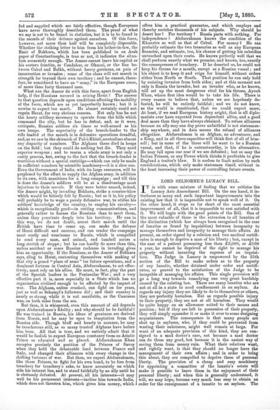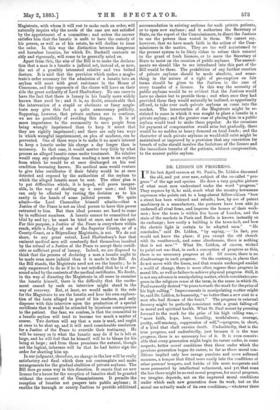LORD SELBORNE'S LUNACY BILL.
IT is with some mixture of feeling that we criticise the Lunacy Acts Amendment Bill. On the one hand, it introduces so many and such important improvements into the existing law that it is impossible not to speak well of it. On the other hand, it stops so far short of the most essential improvement of all, that it is impossible to rest satisfied with it. We will begin with the good points of the Bill. One of the most valuable of these is the extension to all lunatics of the distinction (which has always been recognised in the case of lunatics so found by inquisition) between incapacity to manage themselves and incapacity to manage their affairs. At present, an order signed by a relation and two medical certificates is enough to deprive a man of his liberty ; but, except in the case of a patient possessing less than £2,000, or £100 a year, he cannot be deprived of the right to manage his property without incurring the expense of an inquisition. The Judge in Lunacy is empowered by the 35th section of the Bill to make orders as to the property of any lunatic whether detained under order and certificates, or proved to the satisfaction of the Judge to be incapable of managing his affairs. This single provision will go a long way towards remedying one very great hardship caused by the existing law. There are many lunatics who are not at all in a state to need confinement in an asylum. As regards any injury they are likely to do to themselves or others, they are perfectly harmless. But as regards possible injury to their property, they are not at all harmless. They would be quite happy on an allowance suited to their means and position ; but if they are left in possession of their property, they will simply squander it or make it over to some designing acquaintance. The consequence is that many people are shut up in asylums, who, if they could be prevented from wasting their substance, might well remain at large. For want of an adequate provision of this kind, they are consigned to a mad doctor's care, not because a mad doctor can do them any good, but because it is the easiest way of saving them from money ruin. What their relatives want, and rightly want, is that they should no longer have the management of their own affairs ; and in order to bring this about, they are compelled to deprive them of personal liberty. The provision of a cheap and easy machinery for appointing a committee of the lunatic's estate will make it possible to leave them in the enjoyment of their personal liberty ; and when this is generally understood, it will, we may hope, become very much less easy to obtain an order for the consignment of a lunatic to an asylum. The Magistrate, with whom it will rest to make such an order, will naturally inquire why the needs of the case are not satisfied by the appointment of a committee ; and unless the answer satisfies him that the lunatic is unfit to have the custody of his person, as well as of his estate, he will decline to issue the order. In this way the distinction between dangerous and harmless lunatics, for which Dr. Backnill contends so ably and vigorously, will come to be generally acted on.
Apart from this, the aim of the Bill is to make the declaration that a man is a lunatic a judicial act, instead of, as now, the act of a possibly interested relative and two bribed doctors. It is said that the provision which makes a magistrate's order necessary for the admission of a lunatic into an asylum will meet with great resistance in the House of Commons, and the opponents of the clause will have on their side the great authority of Lord Shaftesbury. No one cares to have the fact that there is lunacy in his family more widely known than need be ; and it is, no doubt, conceivable that the intervention of a stupid or obstinate or fussy magistrate may give this fact a quite unnecessary publicity. Supposing, however, that private asylums are to continue, we see no possibility of avoiding this danger. It is of more importance to the community to save people from being wrongly imprisoned than to keep it secret that they are rightly imprisoned ; and there are only two ways in which wrongful imprisonment, on plea of madness, can be prevented. One of these ways is to make it no man's interest to keep a lunatic under his charge a day longer than is necessary. In that case, it would matter very little by what process an alleged lunatic came under treatment. No relative would reap any advantage from sending a man to an asylum from which he would be at once discharged on his real condition becoming known. No medical man would venture to give false certificates if their falsity would be at once detected and exposed by the authorities of the asylum to which the alleged lunatic must be sent. The other plan is to put difficulties which, it is hoped, will prove insuperable, in the way of shutting up a sane man ; and this can only be effected by vesting the decision as to his sanity in the hands of some judicial person. We quite admit—the Lord Chancellor himself admits—that a Justice of the Peace is not an ideal person to have this power entrusted to him. But then ideal persons are hard to come by in sufficient numbers. A lunatic cannot be committed for trial by and by ; he must be tried at once, and on the spot. For this purpose, a Justice of the Peace is everywhere within reach, while a Judge of one of the Superior Courts, or of a County-Court, or a Stipendiary Magistrate, is not. We do not share, to any great extent, Lord Shaftesbury's fear that eminent medical men will constantly find themselves insulted by the refusal of a Justice of the Peace to accept their certificate as sufficient proof of lunacy. Indeed, we are disposed to think that the process of declaring a man a lunatic ought to be made even more judicial than it is made in the Bill. As the Bill stands, the Magistrate need not see the lunatic ; he is only empowered to do so if he is not satisfied that he is of unsound mind by the contents of the medical certificates. No doubt, in the way of directing the Magistrate in all cases to examine the lunatic himself, there is the difficulty that the excitement caused by such an interview might stand in the way of recovery. But, at least, we would make it the rule for the Magistrate to see the lunatic and hear his own explanation of the facts alleged in proof of his madness, and only dispense with this interview upon the production of a special certificate that it would be attended by injurious consequences to the patient. Our fear, we confess, is that the committal to a lunatic asylum will tend to become too much a matter of course. Two doctors will say that a man is mad, and ought at once to be shut up, and it will need considerable resolution for a Justice of the Peace to override their testimony. He will be uneasy as to what the lunatic may do if he is left at large, and he will feel that he himself will be to blame for his being at large ; and from these premisses the natural, though not the logical, inference will be that he had better sign the order for shutting him up.
In our judgment, therefore, no change in the law will be really satisfactory and final which does not contemplate and make arrangements for the gradual abolition of private asylums. The Bill does go some way in this direction. It enacts that no new licence for a house for the reception of lunatics shall be granted without the consent of the Commissioners. It permits the reception of lunatics not paupers into public asylums ; it enables the borough or county Justices to provide additional accommodation in existing asylums for such private patients, or to open new asylums ; and it authorises the Secretary of State, on the report of the Commissioners, to direct the Justices to use the powers thus vested in them. We cannot say, however, that we have much faith in the action of the Commissioners in the matter. They are too well accustomed to the present system to be likely either to refuse their consent to the grant of fresh licences, or to move the Secretary of State to insist on the creation of public asylums. The amendments we should like to see introduced into this part of the Bill would be these. The prohibition of any further creation of private asylums should be made absolute, and something in the nature of a right of pre-emption on fair terms should be given to the Justices in the case of every transfer of a licence. In this way the necessity of public asylums would be so evident that the Justices would have no choice but to provide them ; and when once they had provided them they would naturally be inclined, as opportunity offered, to take over such -private asylums as came into the market. The intervention of the Magistrate might be restricted to cases in which it was sought to place a lunatic in a private asylum ; and the greater ease of placing him in a public asylum would tend to make them popular. As the occasions for payment of compensation would arise but gradually, there would be no sudden or heavy demand on local funds ; and the character of such private asylums as would still exist might be maintained or improved by a provision that any conviction for breach of rules should involve the forfeiture of the licence and the immediate transfer of the patients, without compensation, to the nearest public asylum.



































 Previous page
Previous page